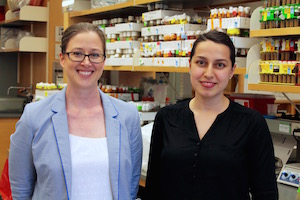 |
|
| GSBS student Hatem Elif Kamber Kaya (right) and postdoctoral associate Sonia Hall, PhD, are advancing women in science as Genetics Society of America members who participated in this year’s Allied Genetics Conference |
Graduate School of Biomedical Sciences student Hatem Elif Kamber Kaya was honored to have two speaking engagements at The Allied Genetics Conference, the annual national meeting of the Genetics Society of America held in Orlando from July 13 to 17.
In her first talk, Kamber Kaya offered advice on navigating graduate school at the Next Generation Mixer for Undergraduates, a career development event held on July 13.
“I’m excited to talk to young undergraduates about my research experiences and my life experiences in graduate school,” said Kamber Kaya, a PhD student in the lab of Andreas Bergmann, PhD, professor of molecular, cell & cancer biology. “I’m especially interested as a woman in recruiting other women to science.”
Kamber Kaya was recommended to serve on the panel by GSBS postdoctoral associate Sonia Hall, PhD. Dr. Hall became a member of the lab of Eric Baehrecke, PhD, professor of molecular, cell & cancer biology, after earning her PhD at the University of Kansas. Active in the Genetics Society of America since 2010, Hall currently serves as trainee representative on the society’s board of directors and is a member of its trainee organizing committee. She and Kamber Kaya met as fellow Drosophila researchers whose labs held joint meetings.
For her second talk, Kamber Kaya discussed her research. The acceptance of her abstract for platform talk at the Scientific Sessions for the Drosophila section of the conference is a special honor for a graduate student. Her studies in the fruit fly model focus on understanding regulation of caspases, a family of enzymes that play essential roles in programmed cell death.
“Elif was an outstanding representative of UMass Medical School, showcasing many of the benefits of being a grad student our institution,” said Hall. “She had an opportunity to talk about the life experience as a grad student, and her graduate training prepared her to give a scientific talk the next day.”
Both women credit this dual opportunity to the focus on biomedical sciences career development at UMMS, which is one of 17 universities to receive a National Institutes of Health Broadening Experiences in Scientific Training (BEST) grant. UMMS has established a mandatory career preparation curriculum for GSBS students through its BEST program.
“I have gained many skills at the GSBS, become stronger as a person and believe I will be a good mentor,” said Kamber Kaya. “I earned a master’s of life at graduate school during my PhD experience.”
Founded in 1931 as the professional scientific society for genetics researchers and educators, the Genetics Society of America has more than 5,500 members worldwide who work to deepen understanding of the living world by advancing the field of genetics. The society also has a deep commitment to education and fostering the next generation of scholars in the field.
Related stories on UMassMedNow:
Fuhrmann discusses career development for PhDs in May issue of The Scientist
Dean Carruthers calls on GSBS to help increase number of women in science
NIH grant integrates career planning with scientific training
UMMS tech tool helps scientists navigate career path